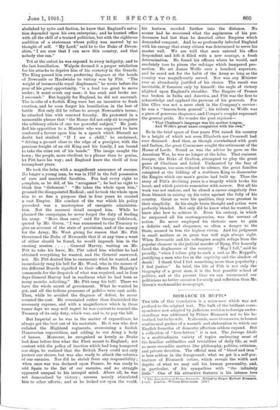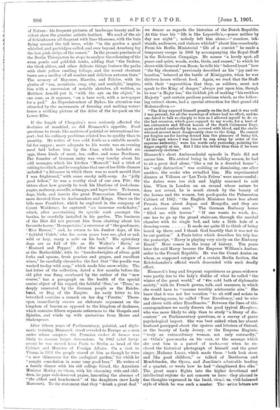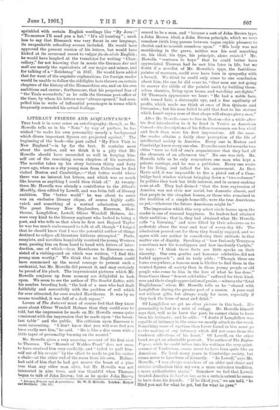BISMARCK IN MUFTI.* THE title of this translation is a
misnomer which was not prefixed to the original text. The bulk of the brilliant corre- spondence now adapted by judicious revision to foreign under- standings was addressed by Prince Bismarck not to his be- trothed, but to his wife. It abounds, more Germanico, in honest sentimental gushes of a warmth and elaboration to which our English formulas of domestic affection seldom expand. But a collection of " love-letters " it is not. The farrago libelli is a multitudinous variety of topics embracing most of the familiar sublimities and trivialities of daily life, as well as more recondite matters like philosophy, politics, criticism, and private devotion. The official man of "blood and iron" is here seldom in the foreground : what we get is a self-por- traiture of Bismarck intinte, which reveals the width and depths of what we may call his human personality, and, in particular, of his sympathies with "the infinitely little." One of his attractive features is his intense love
• The Lore-Letters.of Prince Bismarck. Edited-by Prince Herbert Bismarck. 2 vols. London : William Heinemann. [20e.1 of Nature : his frequent pictures of landscape beauty and in- cident show the genuine artistic instinct. We read of the air of Schonhausen all fragrant with lime-blossoms, with the bats flying around the tall trees, while "in the garden a quail whistled, and partridges called, and over beyond Arneberg lay the last pink stripe of the sunset." In the prosaic precincts of the Berlin Thiergarten he stops to analyse the colouring of the swan ponds and gold-fish tanks, adding that "the lindens, the black alders, and other delicate things bestrew the paths with their yellow rustling foliage, and the round chestnut burrs are a medley of all sombre and delicious autumn tints." The scenery of Bayonne, Biarritz, and Falaise, with its glories of "sea, mountain, crag, city, and sunlight," inspires him with a succession of notable sketches, all written, as Matthew Arnold put it, "with the eye on the object," in one case, as it appears, "on a bare rock, with a newspaper for a pad." As Superintendent of Dykes, his attention was attracted by the movements of freezing and melting water ; hence a striking picture of the drive of the ice-pack on the Lower Elbe.
If the length of Cleopatra's nose seriously affected the destinies of mankind, so did Bismarck's appetite. Food questions he treats like matters of palatial or international im- port: but his culinary problems related less to quality than to quantity. He writes of two cold fowls as a suitable mouth- ful for supper ; more adequate to his wants was an evening meal laid before him by the Czar, which included six 9ggs, three kinds of meat, tea, coffee, and some Bordeaux. The founder of German unity was very touchy about his 3old sausages, which his kitchen " Mamsell " had a trick of 3utting too thick, and he complains that one of her little dinners included "a fricassee in which there was so much mould that was frightened," with some smoky milk-soup. As "jolly good fellow," he was a worthy rival of our own Pitt : the Letters show how gravely he took his libations of iced-cham- pagne, malmsey, moselle, schnapps, and lager-beer. To horses, dogs, birds, and insects the great Pomeranian Nimrod was more devoted than to Ambassadors and Kings. Once on the hills near Frankfort, which he explored in the company of Count Waldersee, he captured "an immense cockchafer," which, after ascertaining its specific rank amongst the beetles, he carefully installed in his garden. The business of the Diet did not prevent him from chatting about his favourite horse, Mousquetaire,' a successor of "the good mare, Miss Breeze,'" and, to return to his Junker days, of his "faithful Caleb,' who for seven years bore me, glad or sad, wild or lazy, many a mile on his back." His epistolary dogs are as full of life as Sir Walter's Bevis,' or Mustard and Pepper.' After the mention of a dinner at the Rothschilds', with its "hundredweights of silver, gold forks and spoons, fresh peaches and grapes, and excellent wines," he carefully chronicles the fact that "the poodle was washed to-day with soap," which made him snow-white. The last letter of the collection, dated a few months before the old pilot was flung overboard by the author of the "new course," has a paragraph on the health of the special canine object of his regard, the faithful Sire,' or Tiras,' so deeply venerated by the German people as the Reichs- hund, or Dog of the Empire. An early letter to his betrothed contains a remark on her dog Finette.' There- upon immediately ensues an elaborate argument on the kingdom of heaven as opposed to the kingdom of darkness, which contains fifteen separate references to the Gospels and Epistles, and winds up with quotations from Moore and Shakespeare.
After fifteen years of Parliamentary, palatial, and diplo- matic training, Bismarck stood revealed to Europe as a man under whose auspices the Prussian rocher de bronze was likely to assume larger dimensions. In 1862 Oda forty- seven) he was moved from Paris to Berlin as head of the Cabinet and Minister of Foreign Affairs. On a visit to Vienna in 1864 the people stared at him as though he were "a new rhinoceros for the zoological garden," for which he "sought consolation in some very good beer." He writes of a family dinner with his old college friend, the American Minister Motley, to whom, with his charming wife and chil- dren, he pays well-deserved praise, lamenting the absence of ".the oldest and handsomest" of the daughters (now Lady Harcourt). To the statement that they "drank a great deal" we demur as regards the historian of the Dutch Republic. At this time his "life is like Leporello's,—peace neither by day nor night " ; nobody left him alone,—" couriers, ink- stands, audiences, and visitors whirled" about him ceaselessly. From his Berlin Ministerial "life of a convict" he made a temporary escape in 1866 by accompanying the Royal Staff in the Bohemian Campaign. He names "a lovely spot, all peace and quiet, woods, rocks, birds, and sunset," to which he drove with General von Roon ; he tells his "beloved heart " how "the big chestnut," previously described as his "joy and re- laxation," behaved at the battle of Kiiniggriitz, when he was thirteen hours without food. Again, we read that the Staff, with their "superstition that they, as soldiers, must not speak to the King of danger," always put upon him, though he was "a Major too," the ticklish job of making "his reckless Majesty" quit certain perilous positions which, as the follow- ing extract shows, had a special attraction for that grand old Hohenzollern :— " The King exposed himself greatly on the 3rd, and it was well I was present, for all the warnings of others had no effect, and no one dared to talk so sharply to him as I allowed myself to do on the last occasion, which gave support to my words, for a knot of ten cuirassiers and fifteen horses of the Sixth Cuirassier Regi- ment rushed confusedly by us, covered with blood, and the shells whizzed around most disagreeably close to the King. Re cannot yet forgive me for having denied him the pleasure of being hit. • At the spot where I was forced to run away by order of the supreme authority,' were his words only yesterday, pointing his finger angrily at me. But I like him better thus than if he were excessively cautious."
Bismarck's short Ambassadorial episode in Paris did not amuse him. His arrival being in the holiday season, he had to sit a great deal alone, "like a rat in a deserted house " ; his "only distraction" was scolding or dismissing, one after another, the cooks who swindled him. His experimental dinners at Vefours or 'Les Trois Freres' were unsuccessful : the dishes were too rich and highly seasoned to suit him. When in London on an errand whose nature he does not reveal, he is much struck by the beauty of the horses and the women, but pooh-poohs the Palmerston Cabinet of 1862: "the English Ministers know less about Prussia than about Japan and Mongolia, and they are not cleverer than ours." The German Embassy house "filled me with horror." "If one wants to wash, &c., one has to go up the grand staircase, through the marital chamber with its single bed, and into a little hole of a dressing-room It made me quite ill to think of being boxed up there, and I thank God heartily that it was not to be our portion." A Paris letter which describes his trip has the postscript, "Harry is playing very nicely on the Embassy Erard." Here comes in the irony of history. Ten years later the said Harry became the Emperor William's Ambas- sador to the French Republic. He was the Count Arnim on whom, as supposed catspaw of a certain Berlin faction, the Reichskanzler's official wrath descended with such deadly effect.
Bismarck's long and frequent experiences as grass-widower were partly due to the lady's dislike of what he called "the winter of the great world," of "the cold bath of diplomatic society," with its French gowns, talk, and manners, in which she would have to "assume terribly aristocratic airs." She knew that it was not her vocation "to sit stiff and sedate in the drawing-room, be called 'Your Excellency,' and be wise and clever with other Excellencies." Between the lines of this correspondence we easily discern the good typical Hausfrati, who was more likely to skip than to study "a litany of dis- content" on Parliamentary questions, or a survey of grave psychological import. She was best suited when her absent husband gossipped about the oysters and lobsters of Ostend, or the beauty of Lady Jersey, or the Empress Eugenie, "truly an extraordinary woman, not only outwardly," or 'Odin's' paw-marks on his coat, or the sausage which she sent him in a parcel of socks,—or when he en- closed the historical photograph of himself and the great singer, Madame Lucca, which made them "both look stout and like good children," or talked of Beethoven and Mendelssohn, the Opera, and Joachim's admirable leading of a quartet, or wrote how he had "slaughtered five elks." The great man's flights into the higher devotional and intellectual regions do not concern us here : they abound in fine thoughts expressed in the lucid, vivacic us. wiell-balanced style of which he was such a master. The ariier letters are
sprinkled with certain English wordings like "By Jove !" "To-morrow I'll send you a hat," "It's all humbug " ; need- less to say that Bismarck was very fluent in our language, its unspeakable schoolboy areana included. He would have approved the present version of his letters, but would have kicked at its occasonal resort to vulgar fin-de-siecle English ; he would have laughed at the translator for writing "Chan- cellory," for not knowing that in music the German dur and moll are merely the equivalents of our major and minor, and for talking of a " Reichstag " in 1847. He would have added that for want of the requisite explanations, the foreign reader would be unable to follow the sidelights here thrown on certain chapters of the history of the Bismarckian era, and on his own ambitions and career ; furthermore, that his perpetual fear of "the Taxis scoundrels," as he calls the German post-office of the time, by whom his letters were" always opened," had com- pelled him to write of influential personages in terms which frequently concealed his actual feelings.








































 Previous page
Previous page